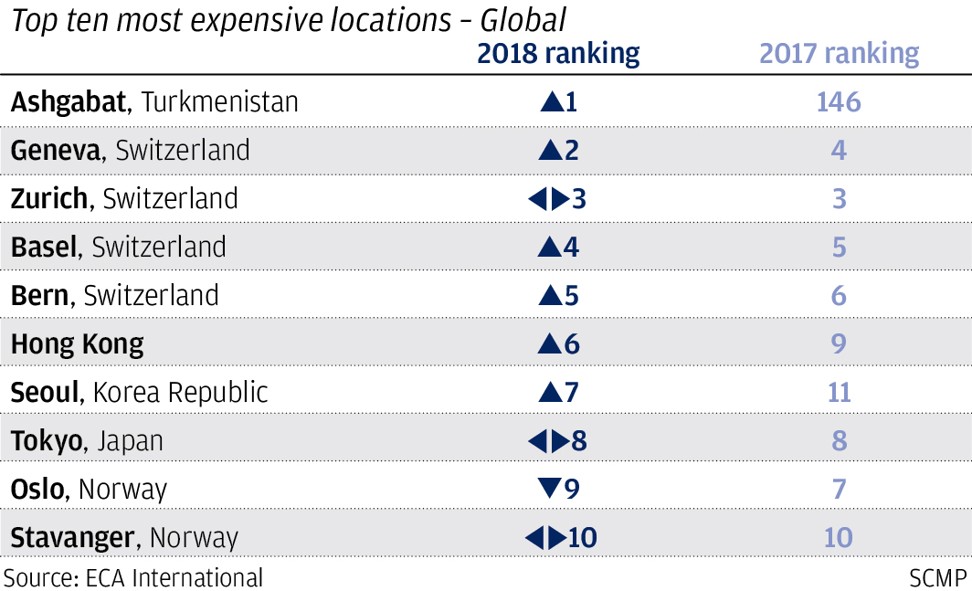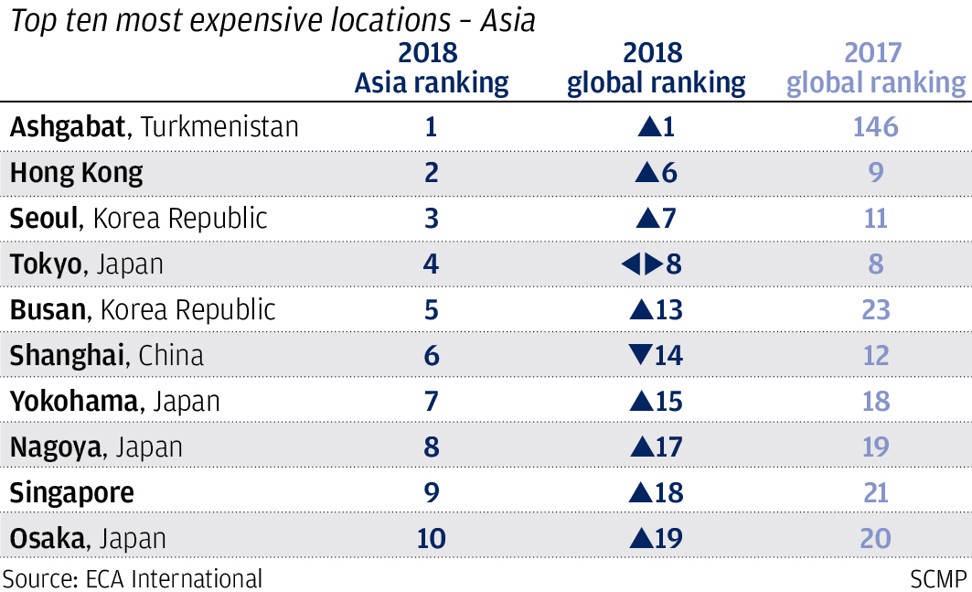
Hong Kong ranked sixth most expensive city for expats to live in, while Turkmenistan’s Ashgabat takes the top spot
- Strengthening currency contributed to city jumping three places up the rankings in a year
- Hong Kong dollar has gained 15 per cent against Japanese yen, 10 per cent against Chinese yuan and almost 6 per cent against Singapore dollar since April 1
The strengthening Hong Kong dollar has catapulted the city up to sixth on the list of the world’s most costly destinations for expats, up from No 9 last year, according to a biannual survey released on Monday.
Rival Singapore also jumped three places, to 18 from 21, because of a strong currency.
Polling 450 locations worldwide every March and September, human capital firm ECA International found currency exchanges were the main factor behind a jump in the rankings for a few Asian locations.
ECA regional director Lee Quane said that “2018 was another strong year for the Hong Kong dollar … leapfrogging locations such as Tokyo and Oslo where the respective currencies have been slightly weaker”.
The world’s most expensive place is Ashgabat, the capital of Turkmenistan, which rocketed from 146th last year as a deepening economic crisis left black-market exchange rates plummeting and shortages in foreign exchange. This in turn fuelled inflation.
Soaring rents and hefty school fees: Hong Kong's cost of living a worry for potential European investors, EU's top envoy says
In Hong Kong, the local currency is getting stronger due to its peg with the US dollar. Since April 1, the Hong Kong dollar has gained 15 per cent against the Japanese yen, 10 per cent against both the Norwegian krone and Chinese yuan, and almost 6 per cent against the Singapore dollar.
This means living in Hong Kong is even more expensive than Scandinavian cities such as Oslo and Stavanger.
“Singapore has long been considered one of the most expensive cities for expats to live and work in, and this looks set to continue,” Quane said. “However, the cost of living is still below that of other major Asian locations with large expat populations, such as Hong Kong, Shanghai and Tokyo.”
The cost of living in Shanghai fell to No 14 from No 12 last year, but it remained the most expensive city in mainland China.
The ECA survey takes the cost of food, household goods, recreational goods and services, clothing, electrical goods, motoring, meals out and alcohol and tobacco into account.
It does not take into consideration rent, car purchases or school fees.
Singaporean Terence Yap, CEO of security firm Guardforce, said the cost of living in the city state was rising, but it was still cheaper than that of Hong Kong.
“Housing is one of the challenges in Hong Kong, but in Singapore, housing is guaranteed by the government,” said Yap, who has worked in Hong Kong for about two decades.
“For many people, a major portion of their monthly salary goes to housing.”
In Singapore, Yap found that a typical dish of Hainan chicken rice or Char Kway Teow fried noodles cost S$5 (US$3.63) at a food hawker centre, up from about S$2 some years ago.
However, Hainan chicken rice with a hot drink in Hong Kong cost about HK$50 (US$6.40) in a traditional cha chaan teng restaurant.
“Cha chaan teng normally offer good deals,” Yap said. “For expats in Hong Kong, education costs for children are a big problem.”
Stephanie Chan, who is from London and is working in the finance industry in Hong Kong, said that in the two years she had spent in the city, she learned that most services were sales driven.
“Hong Kong is a sales driven environment – anything social such as gym memberships and memberships to clubs tend to be very expensive. They encourage you to buy services in bulk, like one payment in advance for a certain number of facials or manicures for example,” she said. “Even though it’s cheaper, it has a greater impact on your discretionary income.”
Chan said she felt the practice was related to rents. Merchants lifted prices or introduced upfront payments for services to get a greater cash flow to offset high rents, she added.
“The biggest factor really is rents because you are paying an extortionate amount for the smallest amount of space, and for those who are expats living in Hong Kong, if they choose Hong Kong Island, they could be paying up to HK$30,000 monthly, just to live alone or with another person, and in many cases rents are more than that.
“This has just gone up over the time I’ve been here,” Chan said, noting the local cost of living was more expensive than what she had experienced in London.




